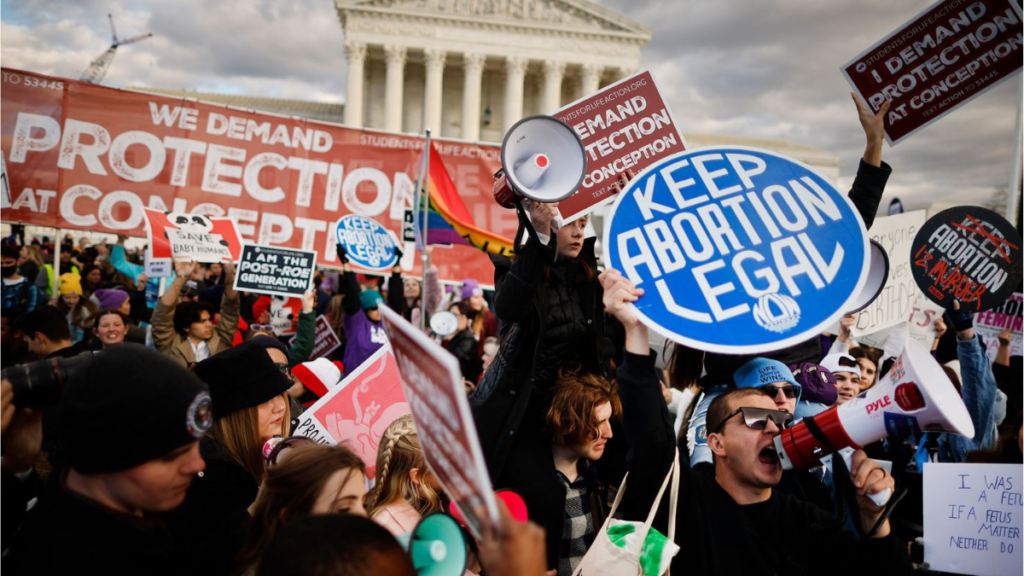The US Supreme Court is set to consider whether to impose restrictions on mifepristone, a widely used abortion drug, even in states where abortion procedures are still permitted. This comes after the Court’s decision to overturn Roe v. Wade last year, reshaping the abortion rights landscape. The case is expected to have far-reaching implications, with the decision expected by July. The Biden administration and drug’s manufacturer are urging the justices to reverse a federal appeals court decision that would restrict access to mifepristone. Critics argue that the FDA did not adequately study the safety implications of the drug’s approval and subsequent modifications. The Biden administration argues that restricting access to mifepristone would disrupt the regulatory framework, negatively impacting women seeking lawful abortions and the healthcare system. If the Supreme Court upholds the lower court’s decision, it could have profound consequences on abortion rights and the pharmaceutical industry.
Case Overview
The focal point of the case is the drug mifepristone, a key component of one of the most prevalent abortion methods in the United States when combined with another drug. The conservative-leaning court, having significantly altered the abortion rights scenario in the country, is set to tackle this case that could have far-reaching implications.
The decision on this case is expected by July, strategically placing the Supreme Court in the midst of the presidential election, where abortion access remains a pivotal issue. Currently, mifepristone is still accessible, with the Supreme Court deciding in April to maintain its availability until the appeals process concludes.
Stakeholders and Positions
The Biden administration and the drug’s manufacturer are urging the justices to reverse a federal appeals court decision that, if implemented, would restrict access to mifepristone. Simultaneously, anti-abortion groups and doctors are pushing for an even more stringent ruling, asserting that the drug’s initial approval in 2000 was also unlawful.
The White House has affirmed its support for the FDA’s approval and regulation of mifepristone, emphasizing its commitment to defending women’s access to reproductive care.
Legal Background
The dispute centers on the scope of the FDA’s authority to regulate mifepristone, a drug deemed safe and effective by the medical community. Initially approved in 2000, the FDA introduced modifications in 2016, 2019, and 2021 to enhance accessibility. Critics, including anti-abortion groups, argue that the FDA did not adequately study the safety implications of the drug’s approval and subsequent modifications.
The legal battle commenced when a US District Judge appointed by former President Donald Trump ruled to halt the FDA’s 2000 approval, citing concerns about the psychological trauma associated with chemical abortion. The 5th US Circuit Court of Appeals later rolled back certain modifications, blocking changes made in 2016 and 2021 while leaving the 2019 approval of a generic version untouched.
Key Arguments
Challengers assert that the FDA unlawfully removed safeguards for the drug, making mail-order abortions more perilous. The debate also delves into the FDA’s purported failure to consider the psychological impact on women and the frequency of the drug’s misuse in cases of ectopic pregnancies.
The Biden administration argues that restricting access to mifepristone would disrupt the regulatory framework, negatively impacting women seeking lawful abortions and the healthcare system. They emphasize the rarity of serious adverse events when the drug is used according to approved conditions.
Potential Implications
If the Supreme Court upholds the lower court’s decision to restrict access, it could have profound consequences on abortion rights and the pharmaceutical industry. Solicitor General Elizabeth Prelogar contends that such a decision would jeopardize the regulatory regime for mifepristone, impacting women, healthcare providers, and the broader healthcare system.
Conclusion
As the US Supreme Court prepares to make a decision on this crucial case, the nation watches closely, aware of the potential ramifications for abortion rights and the healthcare landscape. The outcome could further shape the ongoing debate around reproductive rights and become a focal point in the upcoming presidential election. The Court’s decision is expected to be a significant milestone in the evolving narrative of abortion rights in the United States.







